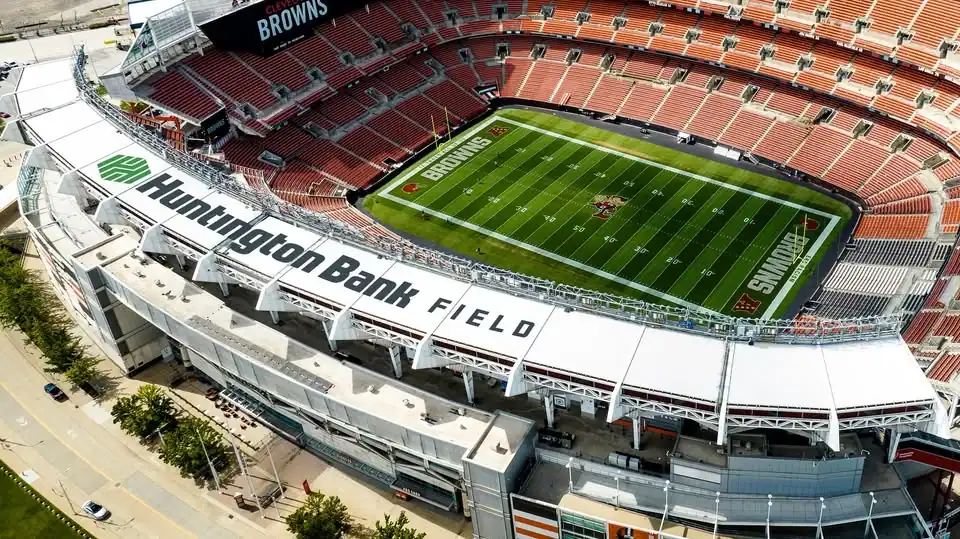By Staff Writer
State leaders and the Cleveland Browns say a new, enclosed stadium in Brook Park could be a regional economic catalyst. The current plan carries an estimated price tag of about $2.4 billion (U.S.), with $600 million in state support and a separate $100 million settlement proposed between the city and the team to end litigation tied to the move. Final approval by the Cleveland City Council is still required, as reported by AP News.
What the Current Proposal Includes
The two-year Ohio budget signed in July includes $600 million in public funding for the Browns project, with the administration describing it as part of a broader economic development strategy. Axios reported that the team would make a significant private investment, with additional local and site infrastructure pieces still to be worked out among the parties.
A separate settlement framework announced in mid-October outlines a $100 million package connected to ending cross-litigation and clearing the way for the Brook Park project. This includes an upfront payment and scheduled future payments, along with demolition and redevelopment steps for the current lakefront site. Construction has been discussed on a 2026 to 2029 timeline, subject to final agreements, according to AP News.
Council Pushback on Deadline
City Council has questioned the process and settlement. In a memo described by WTOL local reporting, Council President Blaine Griffin directed the city’s law director not to dismiss lawsuits without council approval, asserting the council’s role over the matter. Council has also raised concerns about a Nov. 24 deadline tied to the settlement legislation.
At a public hearing, members of Mayor Justin Bibb’s administration presented their case for the settlement and the stadium plan, noting that the agreement was positioned as the best available option after extended disputes. The hearing underscored that the council intends to continue questioning the administration before taking a vote.
What Individual Council Members Are Saying
Cleveland City Council held a special hearing on Oct. 20 to address Bibb’s deal with the Browns. The meeting was livestreamed on YouTube, and there was strong dissent from some council members.
Ward 16 Council Member Brian Kazy compared the situation to the 1995 move to Baltimore in recent commentary and appearances.
Ward 8 Council Member Michael Polensek criticized the settlement’s value and raised concerns about what the city would net after costs, including demolition. Coverage also captures broader frustration among some members who said they felt excluded from the run-up to the announcement.
Community and Civic Reactions
WKYC coverage and community stakeholders have framed the issue around public benefits, accountability, and the future of the downtown lakefront. Reports note arguments in favor of unlocking lakefront redevelopment if the team departs, alongside cautions that any public outlay should carry enforceable benefits and a transparent process. Key business and neighborhood voices continue to call for clarity on jobs, contracting, and land use.
Terry McNeil, an advocate with Fix Our Streets 216, questioned the logic of the city’s financial concessions in light of its ongoing infrastructure challenges. “How does the city of Cleveland get back anything from the Browns when the city owns the asset?” McNeil said, reflecting broader frustration among residents who argue that scarce public dollars should prioritize roads, housing, and basic services before supporting new sports venues.
How Cleveland’s Deal Compares
Around the league, recent NFL projects have relied on large public contributions. Independent economic research has repeatedly found that stadium subsidies tend to deliver limited measurable gains for taxpayers. Analysts emphasize substitution effects and opportunity costs and recommend guarding against optimistic projections.
While Cleveland’s state share is a smaller percentage than some high-profile cases, the city and region still face material fiscal exposure if revenues underperform or costs overrun, as reported by AP News.
What Remains Undecided
Key open questions for Clevelanders include: how much total public money (state and local) will be committed to the site and related infrastructure; the timing and structure of any payments; how the lakefront will be redeveloped; and what accountability mechanisms will be in the final agreements.
City Council has scheduled further hearings before a vote on the settlement. State funding is contingent on final deals among the Browns, Brook Park, and state development officials.
The bottom line
Supporters argue the project could create construction employment, add year-round event capacity, and free the city to reimagine the lakefront. Critics point to research on stadium economics, the public share of costs, and the risk of repeating past patterns where private benefits outweigh public returns.
With the council asserting its authority over litigation and approvals, the next several weeks will determine whether the final pact balances those interests in a way that Cleveland’s residents consider fair and verifiable.




